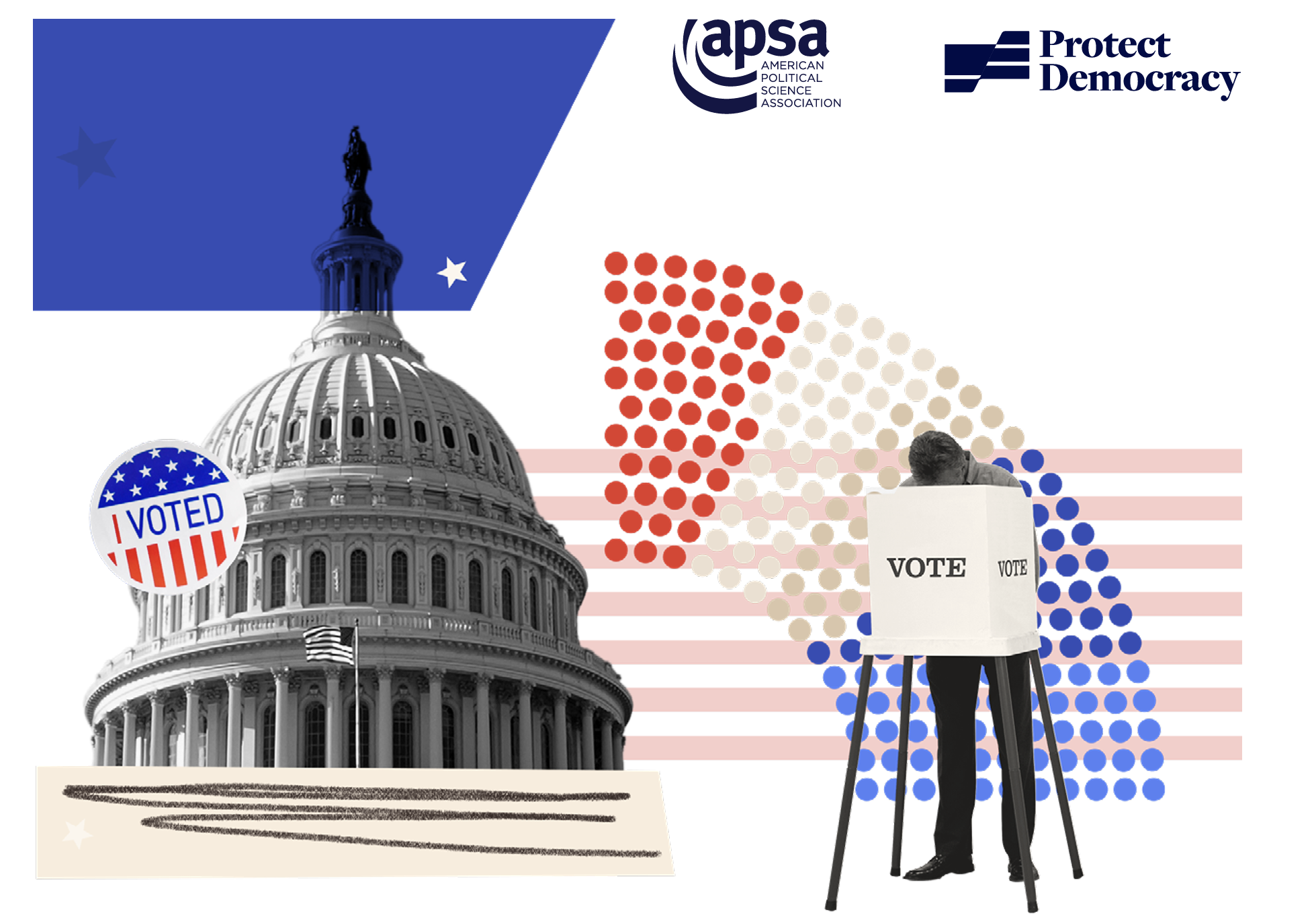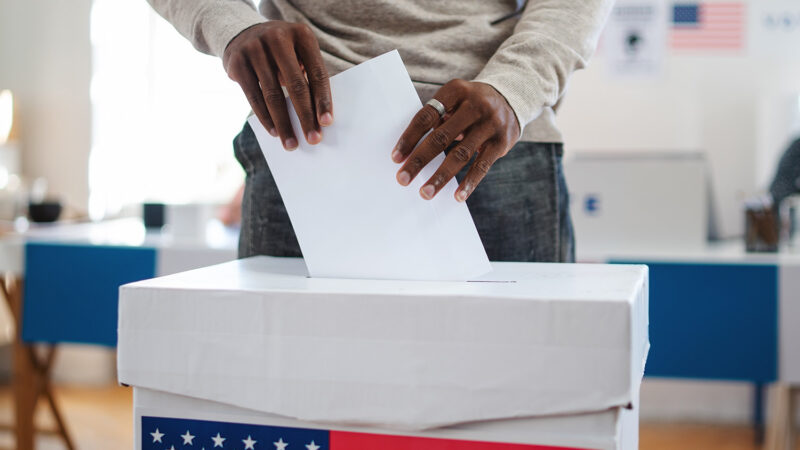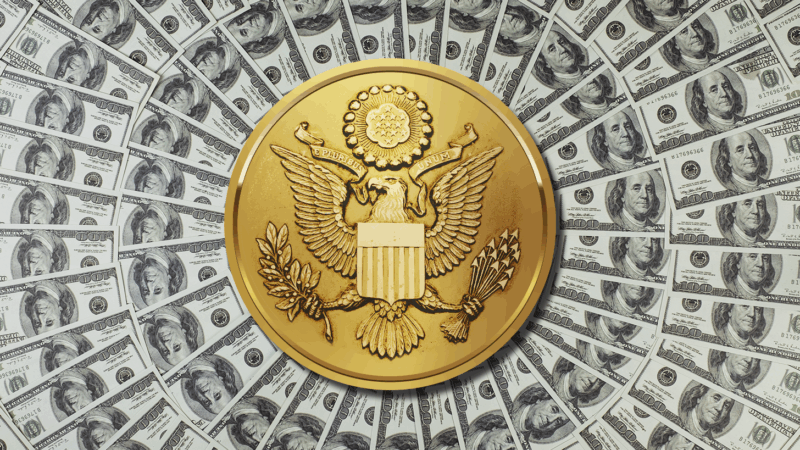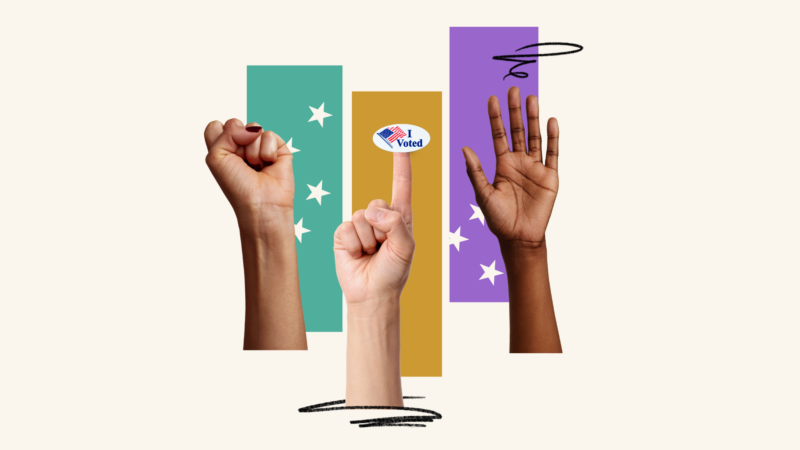More than Red and Blue: Political Parties and American Democracy
- July 11, 2023

Recognizing the serious risk of democratic backsliding in the United States, the American Political Science Association (APSA) and Protect Democracy partnered to sponsor the APSA Presidential Task Force on Political Parties. The Task Force’s report, More than Red and Blue: Political Parties and American Democracy, presents what political science says about the functions of political parties, how we came to have the parties we have, and where sources of change exist.
The Task Force’s report identifies the characteristics of political parties that make them a vulnerability to American democracy and also the critical roles political parties should be playing to help strengthen our democracy. Despite the overwhelmingly low confidence of Americans in political parties, political science shows we need to reform political parties rather than sideline them.
There is substantial skepticism of political parties in the United States, a feature of our political culture dating to the founding. Yet research on democracies around the world yields the consistent finding that political parties are an essential feature of nearly all large democracies.
Historically, political parties helped connect coalitions and interests, mobilize voters, negotiate compromises, and restrain the worst and most dangerous impulses of individual politicians. Today’s weakened political parties are making many of the country’s central political problems worse because of their failure to fulfill their critical roles and pursuit of uncontrolled partisanship.
Read: Political parties should be fixed, not sidelined Read: Political parties should be fixed, not sidelined
Key insights from the report include:
- Features of the current campaign environment, from campaign finance regulations to changes in media landscapes, have made it harder for political parties to fulfill their roles in our democratic process.
- Political parties must balance their openness to new ideas with their advocacy for existing priorities, but American political parties are particularly inclusive, opening them to new voices and interests but also leaving them vulnerable to capture by those with authoritarian objectives.
- Racial realignment between the major parties has been growing for decades, changing the way the parties see the political landscape and their incentives for action.
- Political parties are essential to modern democracy and reform efforts should take their essential roles seriously and explore investments to help heal our political parties.
In addition to diagnosing some of the systemic problems producing the current state of parties and partisanship, More than Red and Blue offers a framework grounded in research for strengthening our democracy. The report also challenges popular anti-party sentiment and provides a fundamental starting point from which we can strengthen all American political parties’ footing in democracy for a better future and begin to develop practical reforms for the betterment of our country.
Table of ContentsTable of Contents
Executive Summary
Foreword
John Ishiyama, University of North Texas
Preface
Mark D. Brewer, University of Maine
Part 1: The Functions of Political Parties
Introduction
David Lublin, American University
Lilliana Mason, Johns Hopkins University
How Much Should we Trust Political Parties?
Susan E. Scarrow, University of Houston
Part 2: How Did We Get Here?
Understanding the Demographic Sources of America’s Party Divisions
Zoltan Hajnal, University of California, San Diego
Permeable Parties: Groups and the Organization of the American Party System
Christina Wolbrecht, University of Notre Dame
Women and Minorities in American Political Parties
Katherine Tate, Brown University
Primaries, Polarization, and Party Control
Seth Masket, University of Denver
Hans Noel, Georgetown University
Protecting Democracy from State Level Threats in the Age of National Parties
Jake Grumbach, University of California, Berkeley
Part 3: Sources of Change
Mass Political Behavior and Party Incentives
Lilliana Mason, Johns Hopkins University
Social Movements and U.S. Political Parties: Evolutionary and Revolutionary Change
Keneshia Grant, Howard University
Marcus Board, Jr., Howard University
Factions, Moderation, and Democratic Responsibility
Rachel Beatty Riedl, Cornell University
Encouraging Cooperation and Responsibility
David Lublin, American University
Benjamin Reilly, East-West Center
Toward a Different Kind of Party Government: Proportional Representation for Federal Elections
Jack Santucci, Drexel University
Matthew Shugart, University of California, Davis
Michael S. Latner, California Polytechnic State University San Luis Obispo
Prioritizing Parties
Seth Masket, University of Denver
Hans Noel, Georgetown University
Conclusion
David Lublin, American University
Lilliana Mason, Johns Hopkins University
Lessons for Practitioners: From Understanding to Action
Jennifer Dresden, Protect Democracy
About the APSA Presidential Task Force on Political Parties
About the APSA Presidential Task Force on Political Parties
Motivated by a profound concern with the state of democracy in the United States and the world and the role political parties have played in undermining democracy, rather than strengthening it, APSA and Protect Democracy partnered to create this Task Force of leading American scholars on political parties and partisanship. The research of the Task Force sought to address four critical questions:
- What does the scholarly literature say about the functions of parties in democracies, and are these functions being performed by the major parties in the United States?
- What are the reasons for the current state of the political parties in the United States?
- How do we get our parties and leaders to behave “responsibly”?
- What are the major insights from the scholarly literature that may suggest opportunities and constraints for institutional and organizational changes that can help promote responsible political behavior?
Task Force Mission Statement
The ultimate purpose of this Task Force is to provide a comprehensive understanding of the ways in which political parties can be responsible promoters of democracy, to prevent a decline into a more authoritarian form of government. The Task Force will achieve this goal by highlighting insights rooted in the academic literature that can inform policy development and strategy.
Task Force MembersTask Force Members
American Political Science Association President, 2021-2022
John Ishiyama, University of North Texas
Task Force Co-Chairs
David Lublin, American University
Lilliana Mason, Johns Hopkins University
Task Force Members
Keneshia Grant, Howard University
Jake Grumbach, University of Washington
Zoltan Hajnal, University of California San Diego
Seth Masket, University of Denver
Hans Noel, Georgetown University
Benjamin Reilly, East-West Center
Rachel Beatty Riedl, Cornell University
Susan E. Scarrow, University of Houston
Matthew Shugart, University of California Davis
Katherine Tate, Brown University
Christina Wolbrecht, University of Notre Dame
About APSAAbout APSA
Founded in 1903, the American Political Science Association (APSA) is the leading professional organization for the study of political science and serves more than 11,000 members in more than 100 countries. With a range of programs and services for individuals, departments, and institutions, APSA brings together political scientists from all fields of inquiry, regions, and occupational endeavors within and outside academe to deepen our understanding of politics, democracy, and citizenship throughout the world. The Association promotes a lively, diverse community of scholars, teachers, students, and practitioners who bring wide-ranging interests, methodologies, and perspectives to the analysis and conduct of government and politics.
Learn more about APSA Learn more about APSA
Related Content
It can happen here.
We can stop it.
Defeating authoritarianism is going to take all of us. Everyone and every institution has a role to play. Together, we can protect democracy.
Donate
Sign Up for Updates Sign Up for Updates
Explore Careers Explore Careers
How to Protect Democracy How to Protect Democracy





